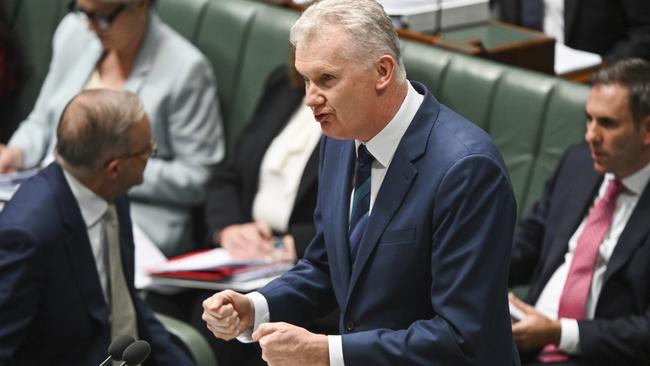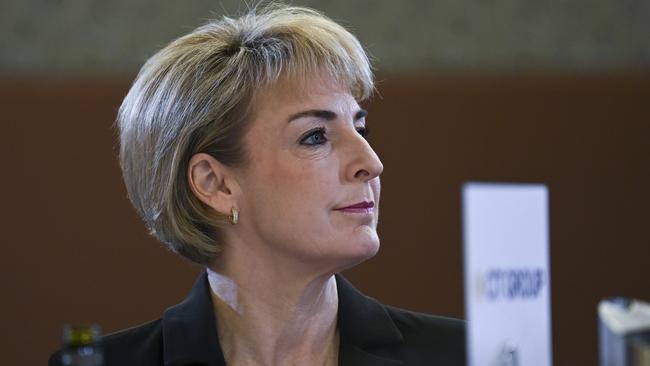Pressure on Tony Burke to reveal cost impact of IR shake-up on public service
Taxpayers face a potential hit under IR changes, with Workplace Relations Minister Tony Burke refusing to detail the cost impact.

Taxpayers face a potential hit under Labor’s industrial relations reforms, with Workplace Relations Minister Tony Burke refusing to detail the cost impact of “same job, same pay” changes on the Australian Public Service.
Amid new industry analysis revealing federal departments and agencies have engaged more than $1.2bn in labour hire contracts since the election, the government is baulking at outlining the cost of ensuring labour hire workers and
full-time public servants receive equal pay.
Analysis of AusTender contracts provided to The Australian shows frontline agencies and departments, including across veterans affairs,health, aged care, social services, the NDIS and Australian Taxation Office, are heavily reliant on labour hire firms to manage surging demand.
Opposition workplace relations spokeswoman Michaelia Cash on Tuesday night said Mr Burke “needs to confirm whether his same job, same pay legislation will apply to the public service, and if so, how much this will cost Australian taxpayers?”
With the government planning to save $811m over four years by converting labour hire and contractor positions to public service roles, the public sector union is pushing for all labour hire employees to have access to “secure APS employment”.
Community and Public Sector Union national secretary Melissa Donnelly said that in the “rare situation where the engagement of labour hire employees is necessary and appropriate, the same job, same pay principle should be applied”.
“Despite labour hire workers generally being paid less, expensive fees to labour hire firms means it costs the Australian public more than it would to provide these workers with direct APS employment,” Ms Donnelly said.

While the Department of Employment and Workplace Relations has asked businesses to “describe the cost impacts of same job, same pay measures … on affected parties and the broader economy”, the government has not addressed possible ramifications for the APS.
In its submission to the department, mining giant BHP last week warned the proposed same job, same pay laws would cost the company up to $1.3bn annually and could cause labour hire demand to “drop off a cliff”.
Amid rising tensions between the government and employers over IR reforms, the Mining and Energy Union on Wednesday will launch a $1m national advertising blitz challenging “fear-mongering” by resources companies.
MEU general secretary Grahame Kelly, who warned the union was prepared to spend more if required, said: “We have already spent millions fighting in the courts and campaigning over several years to change the laws affecting casual labour hire workers in our industry.”
Mr Kelly said the new laws would close the loophole allowing companies to avoid paying the wages and conditions negotiated under site enterprise agreements by outsourcing jobs to labour hire companies paying barely above the legal minimum.
Department of Employment and Workplace Relations secretary Natalie James on Tuesday told a senate estimates hearing that she could not imagine the public sector would be carved out from the same job, same pay laws.
Department officials confirmed that 935 contractors were currently engaged by Mr Burke’s department and the average cost of engaging a labour hire employee was $58/hour, compared with $35/hour for a directly employed permanent public sector worker. The $58 rate was the amount paid to the labour hire firm, not what was paid to the worker.
Agriculture Minister Murray Watt, appearing on behalf of Mr Burke, said labour hire agencies were paid a higher hourly rate for the workers they employed than permanent public servants because the agencies made a margin and the hourly rate did not reflect what they received.
“The motivation for this (same job, same pay) policy has been about labour hire workers who are paid below permanent employees rather than adjust permanent employees’ wages,” Senator Watt said.
Finance and Public Service Minister Katy Gallagher last week told a senate estimates hearing labour hire in the APS was “out of control” and the government was “trying to rein it in”.
While some labour hire contracts were inherited from the Morrison government, others remain due to insufficient APS capabilities. Senator Gallagher last week told the senate estimates hearing that “there will always be a need for some outsourcing, external service providers, external arrangements but it’s out of control”.
Ms Donnelly, who was elected CPSU national secretary in 2019, said: “The ongoing engagement of external providers in the public service continues to have adverse impacts on workplaces and public service delivery every single day, undermining APS capabilities, pay and conditions.”

Senator Cash said the same job, same pay reforms were “all about trying to abolish the labour hire sector in Australia”. “Mr Burke wants to impose new laws on the private sector but his own department can’t even say if they will apply to themselves,” she said. “The government is clearly turning a blind eye to their government’s use of labour hire workers in their departments, whilst they lecture Australian businesses who dare to use labour hire services as somehow damaging the economy.”
Senator Gallagher rejected Senator Cash’s criticism and accused the Coalition of spending “10 years outsourcing APS work to expensive labour-hire firms to feed an ideological obsession against public servants”. “Labor’s plan to convert labour-hire and contractor positions to APS roles will save taxpayers $811m over the next four years,” she said. “It’s astonishing that Senator Cash is still defending the indefensible from opposition by trying to run a protection racket for labour-hire firms that billed taxpayers at exorbitant rates simply to employ public servants that should have been working in-house.”



To join the conversation, please log in. Don't have an account? Register
Join the conversation, you are commenting as Logout